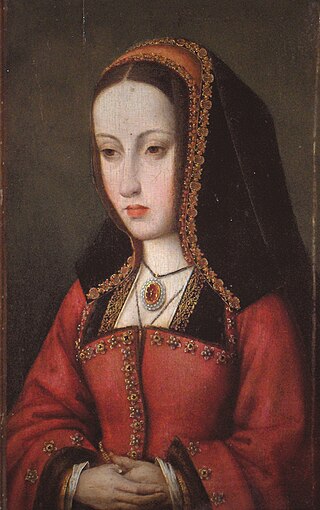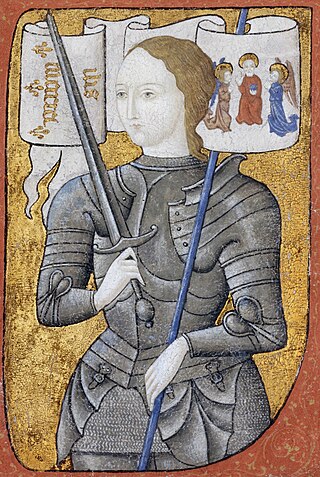
Joanna, historically known as Joanna the Mad, was the nominal queen of Castile from 1504 and queen of Aragon from 1516 to her death in 1555. She was the daughter of Queen Isabella I of Castile and King Ferdinand II of Aragon. Joanna was married by arrangement to the Austrian archduke Philip the Handsome on 20 October 1496. Following the deaths of her elder brother John, elder sister Isabella, and nephew Miguel between 1497 and 1500, Joanna became the heir presumptive to the crowns of Castile and Aragon. When her mother died in 1504, she became queen of Castile. Her father proclaimed himself governor and administrator of Castile.
Joanna is a feminine given name deriving from Koinē Greek: Ἰωάννα, romanized: Iōanna from Hebrew: יוֹחָנָה, romanized: Yôḥānāh, lit. 'God is gracious'. Variants in English include Joan, Joann, Joanne, and Johanna. Other forms of the name in English are Jan, Jane, Janet, Janice, Jean, and Jeanne.

Joan is both a feminine form of the personal name John given to females in the Anglosphere; and the native masculine form of John in the Catalan-Valencian and Occitan languages. In both cases, the name is derived from the Greek via the Latin Ioannes and Ioanna, and is thus cognate with John and related to its many forms, including its derived feminine forms.
De la Vega is a surname in the Spanish language, most of its bearers belonging to the nobility. It means "of the meadow" and may refer to:
Molina is a Spanish occupational surname. Molina is Latin for 'mill' and is derived from another Latin word, mola ('millstone'). The surname originated from the early Middle Ages, referring to a person who operates a mill or a millstone. Other Spanish surnames, like Molinero, have also originated in the work and management of a mill. Spanish municipalities like Molina de Segura (Murcia) or Molina de Aragón still nowadays include millstones or mill blades in their respective coats of arms.
Isabel is a female name of Spanish origin. Isabelle is a name that is similar, but it is of French origin. It originates as the medieval Spanish form of Elisabeth. Arising in the 12th century, it became popular in England in the 13th century following the marriage of Isabella of Angoulême to the king of England. Today it is sometimes abbreviated to Isa.
Juan is a given name, the Spanish and Manx versions of John. The name is of Hebrew origin and has the meaning "God has been gracious." It is very common in Spain and in other Spanish-speaking countries around the world and in the Philippines, and also in the Isle of Man. The name is becoming popular around the world and can be pronounced differently according that region. In Spanish, the diminutive form is Juanito, with feminine form Juana, and feminine diminutive Juanita.
José is a predominantly Spanish and Portuguese form of the given name Joseph. While spelled alike, this name is pronounced very differently in each of the two languages: Spanish ; Portuguese.
Márquez or Marquez is a surname of Spanish origin, meaning "son of Marcos or Marcus". Its Portuguese equivalent is Marques.

Joanna of Austria was Princess of Portugal by marriage to João Manuel, Prince of Portugal. She served as regent of Spain to her brother Philip II of Spain during his trips to England to marry Mary I from 1554 to 1556, and 1556 to 1559. She was the mother of King Sebastian of Portugal.
Elvira is a female given name. First recorded in medieval Spain, it is likely of Germanic (Gothic) origin.
Latin American literature consists of the oral and written literature of Latin America in several languages, particularly in Spanish, Portuguese, and the indigenous languages of the Americas. It rose to particular prominence globally during the second half of the 20th century, largely due to the international success of the style known as magical realism. As such, the region's literature is often associated solely with this style, with the 20th century literary movement known as Latin American Boom, and with its most famous exponent, Gabriel García Márquez. Latin American literature has a rich and complex tradition of literary production that dates back many centuries.

Juan Rodríguez de la Cámara (1390–1450), also known as Juan Rodríguez del Padrón, was a Galician writer and poet, considered the last poet of the Galician school.
Parra is a Spanish, Portuguese, and also Jewish surname, meaning grapevine or trellis, for example, a pergola. It is taken from the word meaning latticework and the vines raised on it. In Hebrew context the surname is used for Jewish people whose ancestors were wine makers as "Parra" is the Hebrew word in Spanish for vitis.
Catalina is a feminine given name. It is a Spanish form of a variation of the name Katherine. Catalina is an equivalent to Katherine or Catherine in English, Αικατερίνη (Ekaterini) and Κατερίνα (Katerina) in Greek, Екатерина (Yekaterina) in Russian, Caterina in Italian, Cătălina in Romanian, Catalan and Ukrainian, Catherine in French, Katarzyna in Polish, and Catarina in Portuguese and Galician.
Ines, and variants, is a feminine given name related to Agnes.
Enriquez is a Spanish patronymic surname meaning "son of Enrique" and a common surname in Mexico, Ecuador and the Philippines.

López or Lopez is a surname of Spanish origin. It was originally a patronymic, meaning "Son of Lope", Lope itself being a Spanish given name deriving from Latin lupus, meaning "wolf". Its Portuguese and Galician equivalent is Lopes, its Italian equivalent is Lupo, its French equivalent is Loup, its Romanian equivalent is Lupu or Lupescu and its Catalan and Valencian equivalent is Llopis.

Herrera is a surname of Spanish origin, from the Latin word ferrāria, meaning "iron mine" or "iron works" and also the feminine of Latin ferrārius, "of or pertaining to iron"; or, alternatively, the feminine of Spanish herrero, which also gives the surname Herrero. Variants of the name include Errera, Ferrera and the less common Bherrera. Its equivalent in Portuguese and Galician is Ferreira. Also, because of Spanish naming customs, some people are listed here with their family name as their second-to-last name.
Carlota is a Catalan, German, Portuguese, Spanish, and Swedish feminine given name that is an alternate form of Charlotte and a feminine form of Charlot and Carl. Notable people known by this name include the following:






